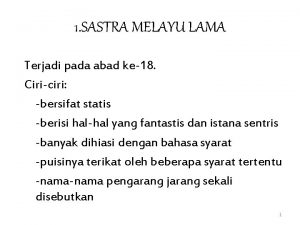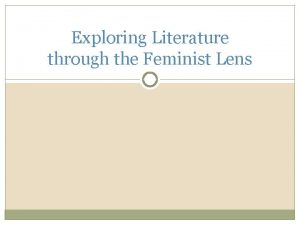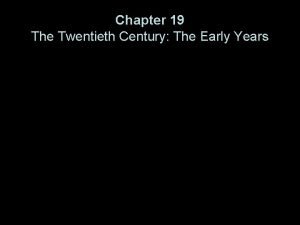Cultural Misfits Gender in Early Twentieth Century Literature











![from Helen in Egypt Pallinode Book One [1] We all know the story from Helen in Egypt Pallinode Book One [1] We all know the story](https://slidetodoc.com/presentation_image_h/c788a4062482b25db3b9e53f9ce092c3/image-12.jpg)

![[2] Lethe, as we all know, is the river of forgetfulness for the shadows, [2] Lethe, as we all know, is the river of forgetfulness for the shadows,](https://slidetodoc.com/presentation_image_h/c788a4062482b25db3b9e53f9ce092c3/image-14.jpg)

- Slides: 15

Cultural Misfits: Gender in Early Twentieth Century Literature BY Professor Georgia Johnston Saint Louis University

From A Room of One’s Own, Virginia Woolf It would be a thousand pities if women wrote like men, or lived like men, or looked like men, for if two sexes are quite inadequate, considering the vastness and variety of the world, how should we manage with one only? Ought not education to bring out and fortify the differences rather than the similarities? For we have too much likeness as it is, and if an explorer should come back and bring word of other sexes looking through the branches of other trees at other skies, nothing would he of greater service to humanity; and we should have the immense pleasure into the bargain of watching Professor X rush for his measuring-rods to prove himself ‘superior’. Mary Carmichael, I thought, still hovering at a little distance above the page, will have her work cut out for her merely as an observer. I am afraid indeed that she will be tempted to become, what I think the less interesting branch of the species — the naturalist-novelist, and not the contemplative. There are so many new facts for her to observe. She will not need to limit herself any longer to the respectable houses of the upper middle classes. She will go without kindness or condescension, but in the spirit of fellowship, into those small, scented rooms where sit the courtesan, the harlot and the lady with the pug dog.

Richard Dadd’s painting, “Crazy Jane, ” 1855

Crazy Jane and the Bishop By William Butler Yeats Bring me to the blasted oak That I, midnight upon the stroke, (All find safety in the tomb. ) May call down curses on his head Because of my dear Jack that's dead. Coxcomb was the least he said: The solid man and the coxcomb. Nor was he Bishop when his ban Banished Jack the Journeyman, (All find safety in the tomb. ) Nor so much as parish priest, Yet he, an old book in his fist, Cried that we lived like beast and beast: The solid man and the coxcomb. The Bishop has a skin, God knows, Wrinkled like the foot of a goose, (All find safety in the tomb. ) Nor can he hide in holy black The heron's hunch upon his back, But a birch-tree stood my Jack: The solid man and the coxcomb. Jack had my virginity, And bids me to the oak, for he (all find safety in the tomb. ) Wanders out into the night And there is shelter under it, But should that other come, I spit: The solid man and the coxcomb.

Prufrock – T. S. Eliot

from T. S. Eliot’s “The Love Song of J. Alfred Prufrock” No! I am not Prince Hamlet, nor was meant to be; Am an attendant lord, one that will do To swell a progress, start a scene or two, Advise the prince; no doubt, an easy tool, Deferential, glad to be of use, Politic, cautious, and meticulous; Full of high sentence, but a bit obtuse; At times, indeed, almost ridiculous— Almost, at times, the Fool. And would it have been worth it, after all, After the cups, the marmalade, the tea, Among the porcelain, among some talk of you and me, Would it have been worth while, To have bitten off the matter with a smile, To have squeezed the universe into a ball To roll it toward some overwhelming question, To say: "I am Lazarus, come from the dead, Come back to tell you all, I shall tell you all"— If one, settling a pillow by her head, Should say: "That is not what I meant at all; That is not it, at all. " But though I have wept and fasted, wept and prayed, Though I have seen my head (grown slightly bald) brought in upon a platter, I am no prophet—and here's no great matter; I have seen the moment of my greatness flicker, And I have seen the eternal Footman hold my coat, and snicker, And in short, I was afraid.

from T. S. Eliot’s “The Love Song of J. Alfred Prufrock” In the room the women come and go Talking of Michelangelo. [. . . ] Shall I part my hair behind? Do I dare to eat a peach? I shall wear white flannel trousers, and walk upon the beach. I have heard the mermaids singing, each to each. I do not think that they will sing to me. I have seen them riding seaward on the waves Combing the white hair of the waves blown back When the wind blows the water white and black. We have lingered in the chambers of the sea By sea-girls wreathed with seaweed red and brown Till human voices wake us, and we drown.

Wilfred Owen Dulce Et Decorum Est Bent double, like old beggars under sacks, Knock-kneed, coughing like hags, we cursed through sludge, Till on the haunting flares we turned our backs And towards our distant rest began to trudge. Men marched asleep. Many had lost their boots But limped on, blood-shod. All went lame; all blind; Drunk with fatigue; deaf even to the hoots Of disappointed shells that dropped behind. GAS! Gas! Quick, boys!-- An ecstasy of fumbling, Fitting the clumsy helmets just in time; But someone still was yelling out and stumbling And floundering like a man in fire or lime. -Dim, through the misty panes and thick green light As under a green sea, I saw him drowning. In all my dreams, before my helpless sight, He plunges at me, guttering, choking, drowning. If in some smothering dreams you too could pace Behind the wagon that we flung him in, And watch the white eyes writhing in his face, His hanging face, like a devil's sick of sin; If you could hear, at every jolt, the blood Come gargling from the froth-corrupted lungs, Obscene as cancer, bitter as the cud Of vile, incurable sores on innocent tongues, -My friend, you would not tell with such high zest To children ardent for some desperate glory, The old Lie: Dulce et decorum est Pro patria mori.

Not Waving but Drowning Nobody heard him, the dead man, But still he lay moaning: I was much further out than you thought And not waving but drowning. Poor chap, he always loved larking And now he’s dead It must have been too cold for him his heart gave way, They said. Oh, no no no, it was too cold always (Still the dead one lay moaning) I was much too far out all my life And not waving but drowning.

Helen -24 - from Heliodora and Other Poems ALL Greece hates the still eyes in the white face, the lustre as of olives where she stands, and the white hands. All Greece reviles the wan face when she smiles, hating it deeper still when it grows wan and white, remembering past enchantments and past ills. Greece sees unmoved, God's daughter, born of love, the beauty of cool feet and slenderest knees, could love indeed the maid, only if she were laid, white ash amid funereal cypresses.

from Helen in Egypt Pallinode Book One
![from Helen in Egypt Pallinode Book One 1 We all know the story from Helen in Egypt Pallinode Book One [1] We all know the story](https://slidetodoc.com/presentation_image_h/c788a4062482b25db3b9e53f9ce092c3/image-12.jpg)
from Helen in Egypt Pallinode Book One [1] We all know the story of Helen of Troy but few of us have followed her to Egypt. How did she get there? Stesichorus of Sicily in his Pallinode, was the first to tell us. Some centuries later, Euripedes repeats the story. Stesichorus was said to have been struck blind because of his invective against Helen, but later was restored to sight, when he reinstated her in his Pallinode. Euripides, notably in The Trojan Women, reviles her, but he also is “restored to sight. ” The later, little understood Helen in Egypt, is again a Pallinode, a defence, explanation or apology. According to the Pallinode, Helen was never in Troy. She had been transposed or translated from Greece into Egypt. Helen of Troy was a phantom, substituted for the real Helen, by jealous deities. The Greeks and the Trojans alike fought for an illusion.

from Helen in Egypt Pallinode Book One Do not despair, the hosts surging beneath the Walls, (no more than I) are ghosts; do not bewail the Fall, the scene is empty and I am alone, yet in this Amen-temple, I hear their voices, there is not veil between us, only space and leiure and long corridors of lotus-bud furled on the pillars, and the lotus-flower unfurled, with reed of the papyrus; Amen (or Zeus we call him) brought me here; fear nothing of the future or the past, He, God, will guide you, bring you to this place as he brought me, his daughter, twin-sister of twin-brothers and Clytaemnestra, shadow of us all; the old enchantment holds, here there is peace for Helena, Helen hated of all Greece.
![2 Lethe as we all know is the river of forgetfulness for the shadows [2] Lethe, as we all know, is the river of forgetfulness for the shadows,](https://slidetodoc.com/presentation_image_h/c788a4062482b25db3b9e53f9ce092c3/image-14.jpg)
[2] Lethe, as we all know, is the river of forgetfulness for the shadows, passing from life to death. But Helen, mysteriously transposed to Egypt, does not want to forget. She is both phantom and reality. The potion is not poison, it is not Lethe and forgetfulness but everlasting memory, the glory and the beauty of the ships, the wave that bore them onward and the shock of hidden shoal, the peril of the rocks (and the poem continues)

How do you do it. Patriarchal Poetry might be withstood. Patriarchal Poetry at peace. Patriarchal Poetry a piece. Patriarchal Poetry in peace. Patriarchal Poetry in pieces. (281)
 Parker v twentieth century fox
Parker v twentieth century fox Parker v twentieth century fox
Parker v twentieth century fox The misfits book cover
The misfits book cover Franklin pierce accomplishments
Franklin pierce accomplishments Strategic gender needs and practical gender needs
Strategic gender needs and practical gender needs Which two sentences contain a restrictive clause?
Which two sentences contain a restrictive clause? Unit 6 early 20th century ga
Unit 6 early 20th century ga Twentieth sunday after trinity
Twentieth sunday after trinity 18th century literature examples
18th century literature examples Feminist criticism of the story of an hour
Feminist criticism of the story of an hour Gender criticism in literature
Gender criticism in literature Gender lens literature
Gender lens literature Early cpr and early defibrillation can: *
Early cpr and early defibrillation can: * Foundations and encounters early american literature
Foundations and encounters early american literature Native american literature before 1600
Native american literature before 1600 Themes of american literature
Themes of american literature





























